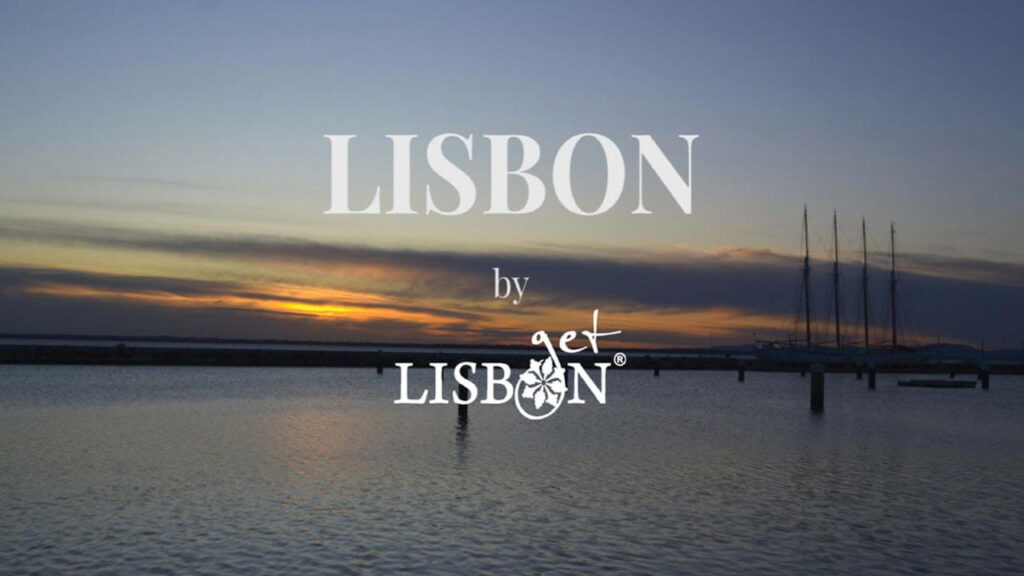Updated on 18 March 2025
Original article published on 15 July 2020
Did you know that Lisbon has poetry on garden benches? Indeed, this urban fixture is not only meant for resting moments, but also to be read.
They might’ve gone unnoticed by you, seeing that they’re not particularly good looking.
However, what makes them special are the inscripted poems inspired by the sea, the Tagus river and Lisbon, written by consecrated personalities of Portuguese literature.
This initiative was started by the Paço D’Arcos Foundation that gifted these benches to the city of Lisbon at different times.
However, more initiatives of this kind have been promoted by the Lisbon City Council and the Santo António Parish Council.
Get to know Lisbon’s historic neighbourhoods in a guided tour and discover unmissable places of this magnificent city.
Paço D’Arcos Foundation
Paço D’Arcos Foundation emerged from the mind of the son of Henrique Belford Correia da Silva (1906-1993), 2nd count of Paço de Arcos, writer and poet who signed himself Anrique Paço d’Arcos.
Created in 1991, this foundation’s main objective is the cultural and artistic diffusion among Portuguese-speaking countries, as well as the preservation of its patrimony, a library of 7 thousand exemplars and manuscripts, which today are kept by the City Council of Cascais.
It also has a vast collection of art pieces by Portuguese and foreign artists, among them the exceptional Graça Morais, Vieira da Silva, Paula Rego, Júlio Pomar, João Cutileiro…
Poetry on Garden Benches – An Initiative by the Paço D’Arcos Foundation
Let’s dive into the places where you can find poetry on garden benches.
Estrela Garden
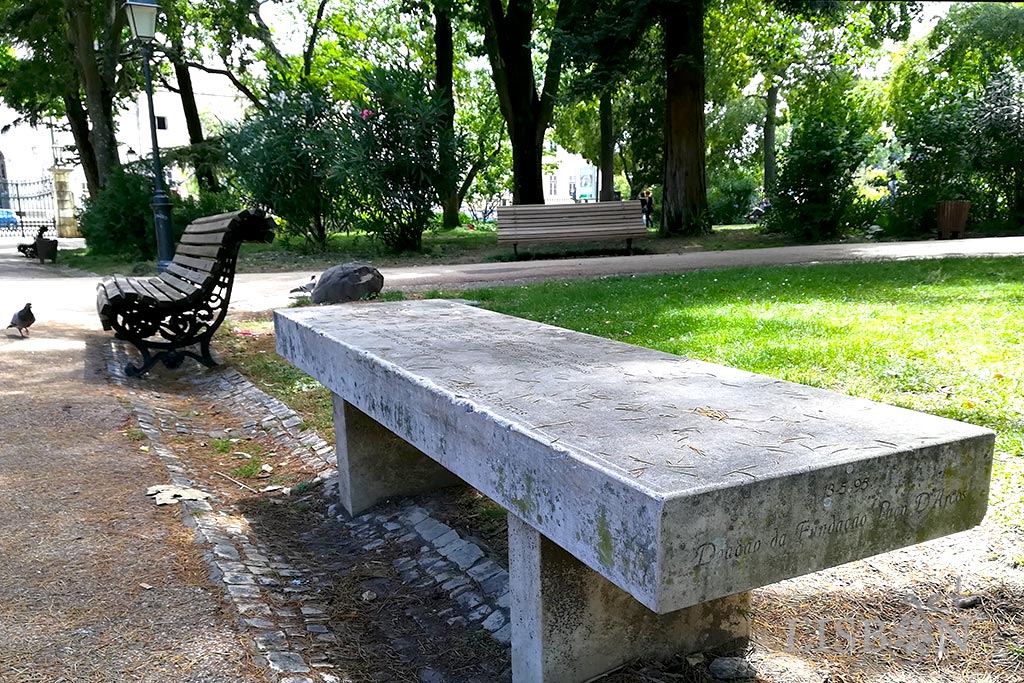
The oldest bench is located in Estrela Garden and has inscripted the date May 13, 1995, which coincides with the 2nd year anniversary of the death of Anrique Paço d’Arcos.
On this bench we can read one of his poems:
Evasão (Evasion)
Não fui ao jardim, / Mas voltei do jardim com uma rosa na mão; / Não fui ao mar, mas regressei das ondas / Com todo o sal do mar nas minhas lágrimas; / Não fui à guerra, mas voltei da guerra / Sem coração… / Um dia está para chegar / Em que hei-de ir e não hei-de voltar…
Anrique Paço D’Arcos


Amoreiras Garden
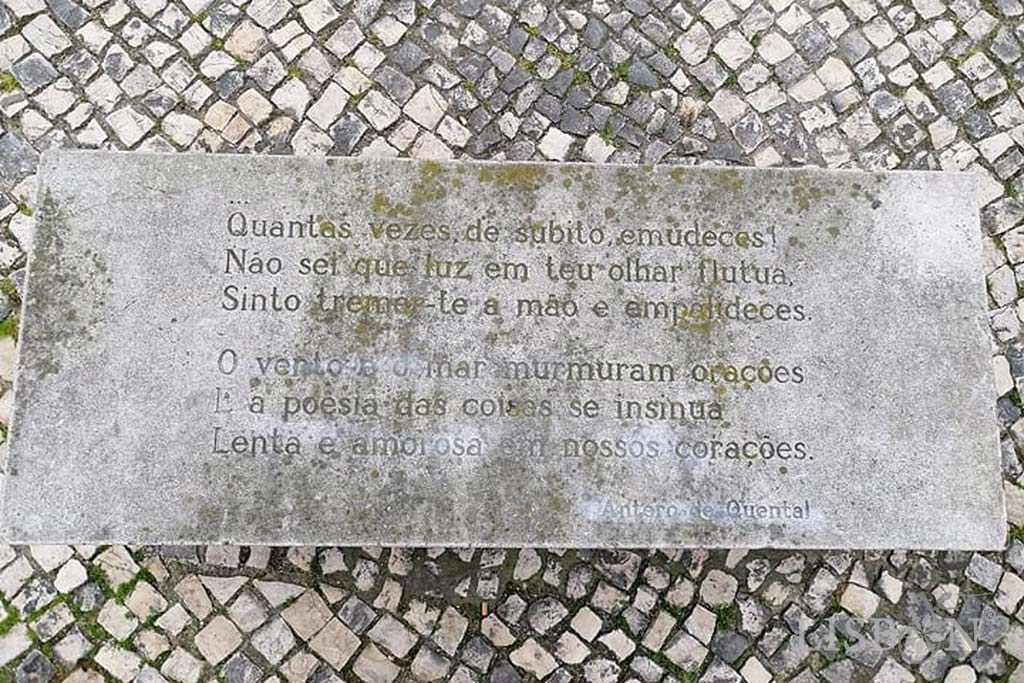
Three years later, on May 13, 1998, another bench appeared, this time in Amoreiras Garden with a poem by Antero de Quental:
Quantas vezes, de súbito, emudeces! / Não sei que luz em teu olhar flutua, / Sinto tremer-te a mão e empalideces. / O vento e o mar murmuram orações / E a poesia das coisas se insinua / Lenta e amorosa em nossos corações.
Antero de Quental
Belém Tower Garden
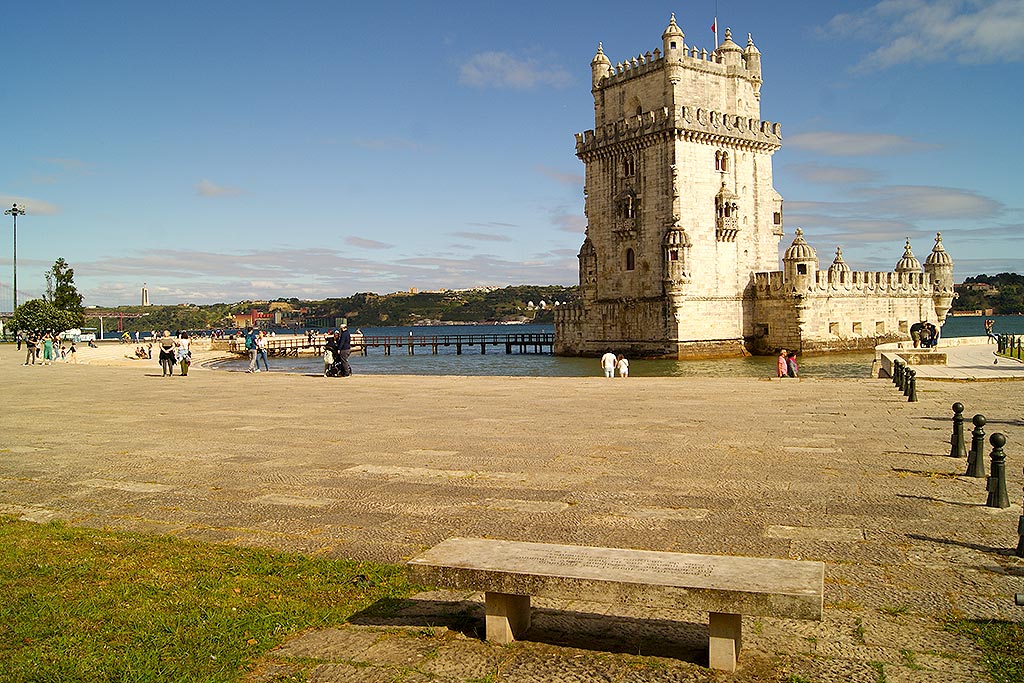
The nine benches, located near the Belém Tower, date back to December 31, 1999.
In this more expressive project, there are inscripted poems by: Teixeira de Pascoaes; Alexandre O’Neil; Fernando Pessoa; Sophia de Mello Breyner Andresen; Eugénio de Andrade; Paço D’Arcos; António Nobre; David Mourão Ferreira and Manuel Alegre.
Ó mar, à luz do luar! Ó mar profundo / Em choros que se espalham sobre o mundo! / Ó anjo imenso que, na mão, sustentas / O cálix da amargura e das tormentas!
Teixeira de Pascoaes
Congresso de gaivotas neste céu / Como uma tampa azul cobrindo o Tejo / Querela de aves, pios, escarcéu / Ainda palpitante voa um beijo / Donde teria vindo? (não é meu…) / De algum quarto perdido no desejo? / De algum jovem amor que recebeu / mandato de captura ou de despejo?
Alexandre O’Neil
Onda que, enrolada, tornas / pequena, ao mar que te trouxe / e ao recuar te transtornas / como se o mar nada fosse. / Por que é que levas contigo / só a tua cessação, / e, ao voltar ao mar antigo, / não levas meu coração?
Fernando Pessoa
Vi as águas os cabos, vi as ilhas / E o longo baloiçar dos coqueirais / Vi lagunas azuis como safiras / Rápidas aves furtivos animais / Vi prodígios espantos maravilhas / Vi homens nus bailando nos areais / Vi o frescor das coisas naturais / Só do Preste João não vi sinais
Sophia de Mello Breyner Andresen
Vêm morrer à praia e são jovens / as sereias, / jovens como andar à chuva, / a brusca melancolia, / o lume aceso da cal, / jovens como as baladas escocesas / ou as molhadas sílabas de Junho, / e com a lua nova / vêm morrer no areal.
Eugénio de Andrade
Noite Negra, negra noite / Ai dos que vão pelo mar! / Menina dos olhos tristes / Acenda as velas no altar / Que Deus vele pelas velas / Que andam perdidas no mar! / Menina dos olhos tristes / A quem o noivo deixou / Reze por ele… (quem sabe / Se nas ondas naufragou?!)
Paço D’Arcos
As algas negro cerrado / que eu trouxe da beira-mar / guardo-as num missal doirado / onde costumo cismar. / Às vezes, triste e cansado / quando o vou a folhear, / dentro do livro encantado /eu oiço as algas chorar…
António Nobre
Por mim não quero já missão nenhuma / senão tal jogo de onda e mais onda / a surpresa da espuma / e a profunda / tentação de morrer em cada onda!
David Mourão Ferreira
Eu vivo lá longe, longe / onde passam os navios / mas um dia hei-de voltar / às águas dos nossos rios.
Manuel Alegre
São Jorge Castle

In 2003, ten years after the death of Anrique Paço D’Arcos, the Foundation and City Council of Lisbon paid homage once again but this time in São Jorge Castle.
Here, there are three benches where a poem by Sophia de Mello Breyner can be read in three languages:
Portuguese:
Digo: “Lisboa” / Quando atravesso-vinda do sul – o rio / e a cidade a que chego abre-se como se do seu nome nascesse / abre-se e ergue-se em sua extensão nocturna / em seu longo luzir de azul e rio / em seu corpo amontoado de colinas / … / Lisboa com seu nome de ser e de não-ser / com seus meandros de espanto insónia e lata / e seu secreto rebrilhar de coisa de teatro / seu conivente sorrir de intriga e máscara / enquanto o largo mar a ocidente se dilata / Lisboa oscilando como uma grande barca / Lisboa cruelmente construída ao longo da sua própria ausência.
English:
I say: “Lisbon” / when I arrive from the south and cross the river / and the city opens up as if born from its name / it opens and rises in its nocturnal vastness / in its long shimmering of blue and of river / in its rugged body of hills / … / Lisbon with its name of being and nonbeing / with its meanders of astonishment insomnia and shacks / and its secret theatre sparkle / its masklike smile of intrigue and complicity / while the wide sea stretches westward / Lisbon swaying like a sailing ship / Lisbon cruelly built next to its own absence
French:
Je dis: “Lisbonne” / Quand j’arrive du sud et traverse le fleuve / et la ville s’ouvre comme si elle naissait de son propre nom / elle s’ouvre et se dresse dans son étendue nocturne / dans son long scintillement d’azur et de fleuve / dans son corps amoncélé de collines / … / Lisbonne avec son nom d’étre et de non-étre / avec ses méandres de merveille insomnie et ferraille / et son éclat secret de chose theatrale / son sourire complice de masque et d’intrigue / tandis qu’à l’óccident la vaste mer s’élarge / Lisbonne oscilante comme une grande barque / Lisbonne cruellement batie autour de sa propre absence
Sophia de Mello Breyner
Rua Arnaldo Ferreira, Lumiar
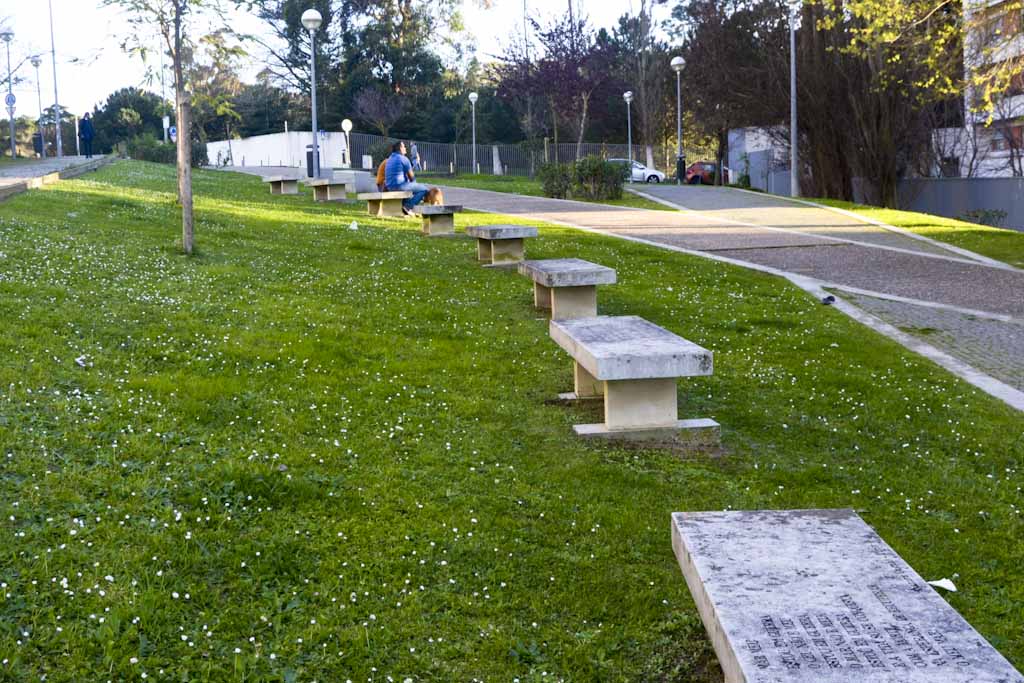
Near Quintas das Conchas e dos Lilases Park, more precisely in Rua Arnaldo Ferreira, eight garden benches with poetry were placed. They date back to September 2, 2005, one year before the 100th anniversary of the birth of Anrique Paço D’Arcos.
Under the theme of “Amar o Mar” (directly translated to “to love the sea”) we can find poetry from eight different lusophone writers: Fernando Pessoa, representing Portugal; Corsino Fortes from Cape Verde; Xanana Gusmão from Timor; Arlindo Barbeitos from Angola; Pascoal D’Artagnan Aurigemma from Guinea-Bissau; Francisco José Tenreiro from São Tomé and Príncipe; Mia Couto from Mozambique and Manuel Bandeira from Brazil.
Mar Meu (my sea)
Estou em guerra / o céu não é meu / estou em guerra / o mar não é meu / estou em guerra / e a vida só se conquista / com a morte… / na esperança de recuperar / o meu mar!
Xanana Gusmão – Timor
Corpo Moreno (swarthy body)
… / como a minha ilha é o teu corpo mulato / tronco forte que dá / amorosamente ramos, folhas, flores e frutos / e há frutos na geografia de teu corpo / … / és tu minha ilha e minha África / forte e desdenhosa dos que te falam à volta.
Francisco José Tenreiro – São Tomé e Príncipe
Mar Português (Portuguese sea)
Ó mar salgado, quanto do teu sal / são lágrimas de portugal! / Por te cruzarmos, quantas mães choraram, / quantos filhos em vão rezaram! / Quantas noivas ficaram por casar / para que fosses nosso, ó mar! / Valeu a pena? Tudo vale a pena / se a alma não é pequena.
Fernando Pessoa – Portugal
Ilha (island)
Tenho a sede das ilhas / e esquece-me ser terra / meu amor, aconchega-me / meu amor, mareja-me / depois, não / me ensines a estrada. / A intenção da água é o mar / a intenção de mim és tu.
Mia Couto – Moçambique
O Cantar Miserável da Noite no Cais (the miserable declaiming in the night at the pier)
… / barco veio: de onde? / Não interessa saber irmão / não interessa. / Se cais não houvesse / gente anónima não tinha no cais / nunca / nunca gente poderia ouvir / a história que mar salgado deveria contar.
Pascoal D’Artagnan Aurigemma – Guiné Bissau
Poemeto Erótico (erotic short poem)
… / a todo o momento o vejo… / teu corpo… a única ilha / no oceano do meu desejo… / teu corpo é tudo o que brilha, / teu corpo é tudo o que cheira… / rosa, flor de laranjeira…
Manuel Bandeira – Brasil
Na Leveza do Luar Crescente (in the lightness of the crescent moonlight)
A nossa terra / é um imenso oceano tropical / que do Índico ao Atlântico / a gente devagar / vai contornando em jangada / de vento e saudade / pelo tamanho do mar
Arlindo Barbeitos – Angola
Ilha (island)
De manhã! As crianças da minha pátria / nascem / com oásis na palma da mão / e plantam ilhas / na boca do sol
Corsino Fortes – Cabo Verde
| Never miss another article | Subscribe here |
More Poetry on Garden Benches
Supported by the Lisbon City Council and the Santo António Parish Council, there are two additional spots where you can find poetry on garden benches.
Corpo Santo Square

In Corpo Santo Square, between Cais do Sodré and Ribeira das Naus, there are 5 benches with poetry.
They were placed from the initiative of the City Council of Lisbon in 2017 and the inscriptions belong to different poems from “Mensagem” by Fernando Pessoa.
“Hoje a vigília é nossa”
in Mensagem – D. Afonso Henriques
“Busca o oceano por achar”
“É a voz da terra ansiando pelo mar”
in Mensagem – D. Dinis
“As nações todas são mistérios”
in Mensagem – D. Tareja
“Aqui ao leme sou mais do que eu”
in Mensagem – O Monstrengo
Torel Garden
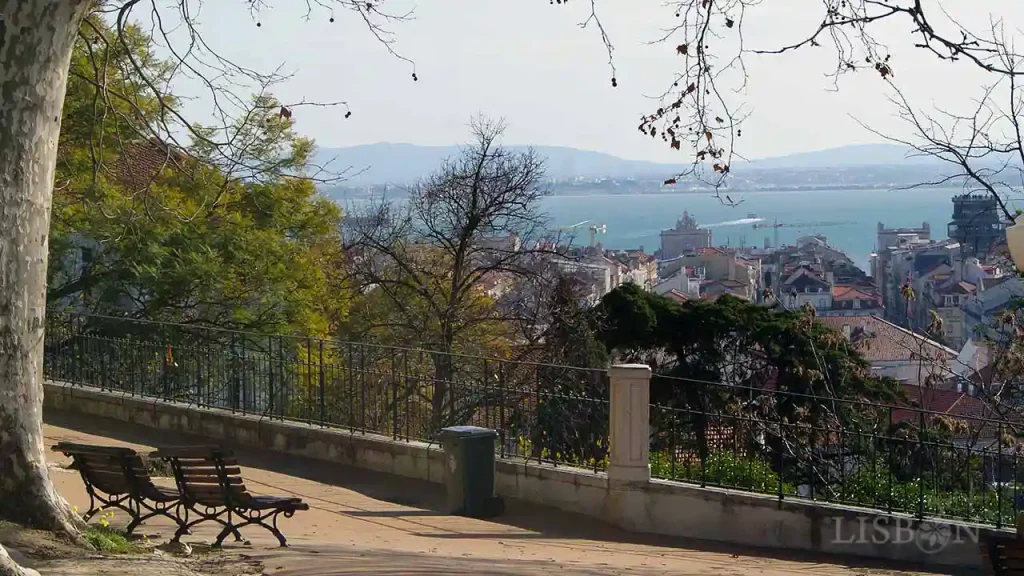
As part of an initiative by the Santo António Parish Council, since 2020, poems by Portuguese-language authors have been engraved on 18 traditional garden benches.
There, you can find the names of renowned writers and playwrights, well-known and lesser-known poems, and verses that make us sing themes evoking Lisbon.Camões, Fernando Pessoa, Florbela Espanca, Eduardo Damas, Ary dos Santos, Carlos Dias, Aníbal Nazaré, João Monge, and the Brazilian poets Vinicius de Moraes and Carlos Drummond de Andrade all have their poetry featured on garden benches.
Amor é um fogo que arde sem se ver;
É ferida que dói, e não se sente;
É um contentamento descontente
É dor que desatina sem doer
Camões
Ah, mas se ela adivinhasse,
Se pudesse ouvir o olhar,
E se um olhar lhe bastasse
P’ra saber que a estão a amar!
Fernando Pessoa
Todas as cartas de amor são
Ridículas
Não seriam cartas de amor se não fossem
Ridículas
Fernando Pessoa
Eu quero amar, amar perdidamente!
Amar só por amar, Aqui…além…
Mais Este, Aquele o Outro e toda a gente
Amar! Amar! E não amar ninguém!
Florbela Espanca
João de Deus, o A, E, I, O, U
São Nicolau que era escola antiga
Em ti cresci e só em ti estou bem
Minha Lisboa, Lisboa velha amiga
Eduardo Damas
Lisboa sim…
Lisboa velha amiga
Tu é que embalas meu sonho, minha esperança
Tu és cidade, a eterna menina
Eu sou em ti a eterna criança
Eduardo Damas
Lisboa sim…
Lisboa velha amiga
da Brasileira que havia no Rossio
e onde o Botto dizia p’ros amigos
os belos versos que alguém jamais ouviu
Eduardo Damas
Brinquei contigo no Largo dos Trigueiros
primeiros passos eu dei p’la tua mão
com a tarde p’lo Terreiro do Paço
Li na cartilha a primeira lição
Eduardo Damas
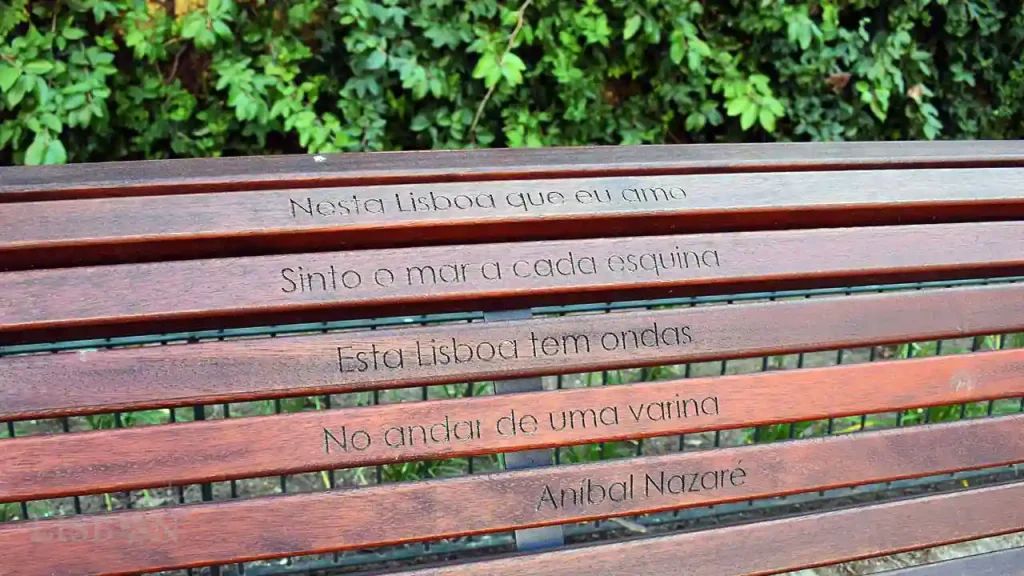
Minha laranja amarga e doce
Meu poema
feito de gomos de saudade
Minha pena
pesada e leve
secreta e pura
minha passagem para o breve, breve
instante da loucura
Ary dos Santos
A cidade tem praças de palavras abertas
como estátuas mandadas apear
A cidade tem ruas de palavras desertas
como jardins mandados arrancar
Ary dos Santos
Sei meu amor inventado que um dia
teu corpo pode acender
uma fogueira de sol e de fúria
que nos verá nascer
Ary dos Santos
Lisboa andou de lado em lado
Foi ver uma toirada, depois bailou, bebeu
Lisboa ouviu cantar o fado
rompia a madrugada quando ela adormeceu
Carlos Dias
Nesta Lisboa que eu amo
sinto o mar em cada esquina
Esta Lisboa tem ondas
no andar de uma varina
Aníbal Nazaré
Cidade tão antiga, cidade amiga,
modesta e bela,
varia com as marés
e tem o Tejo a seus pés a chorar de amor por ela
Aníbal Nazaré
São os loucos de Lisboa
que nos fazem duvidar
a terra gira ao contrário
e as ondas nascem no mar
João Monge
De tudo ao meu amor serei atento
antes, e com tal zelo, e sempre, e tanto
que mesmo em face do maior encanto
dele se encante mais meu pensamento
Vinicius de Moraes
E nosso amor que brotou
do tempo não tem idade
pois só quem ama
escutou o apelo da eternidade
Carlos Drummond de Andrade
Ela viu, pensou, gostou
Ele fez
Ela sorriu e chorou
Autor desconhecido (excepto para ela)
The project getLISBON has been very rewarding and we want to continue revealing the singularities of fascinating Lisbon.
Help us keep this project alive!
By using these links to make your reservations you’ll be supporting us. With no extra costs!
• Looking for a different experience? We can create a customised itinerary based on your interests. Contact us!
• Or if you prefer tours and other activities in various destinations, take a look at GetYourGuide.
• Save time and money with a flexible Lisbon Card!




